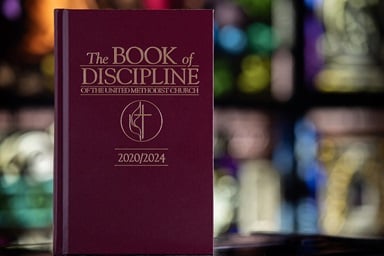A United Methodist elder is facing a formal complaint that she is a “self-avowed practicing” lesbian, a chargeable offense under church law.
This marks the second time this year that a New York Annual (regional) Conference clergy member is facing a complaint under the denomination’s stance on homosexuality.
The Rev. Sara Thompson Tweedy, 39, previously has served in parish ministry and now serves in extension ministry as the dean of student development services in the State University of New York Sullivan, a community college. She also serves on the ministry team at Memorial United Methodist Church in White Plains, N.Y., where she preaches monthly.
She is on the steering team of Methodists in New Directions, an unofficial caucus that advocates for greater inclusion of lesbian, gay, bisexual and transgender people in the New York Conference.
The group announced July 8 that Tweedy faces a complaint and potential church trial, which the New York Conference has confirmed. On the caucus website, Tweedy’s biography notes that she “shares life with her spouse, Kristin Marcell” and their two sons.
Tweedy started as a local pastor in 2001 and was ordained an elder in 2006. She told United Methodist News Service that she and Marcell married in 2008 in Canada after New York began recognizing same-sex civil marriages performed where they are legal. The State of New York legalized same-sex civil marriage in 2011.
“I have served this church faithfully almost my entire life long and certainly for most of my professional life,” she said. “I am in this situation because I love another woman, and I have been honest about my identity. What kind of ‘just resolution’ can come out of an unjust process? That is out of my hands and in the hands of church counsel and possibly, a jury.”
Because of confidentiality rules, neither the conference nor Tweedy disclosed the name of the individual who filed the complaint .
Leaders of the Wesley Fellowship — an unofficial caucus of evangelical and orthodox pastors and laity in the conference — said they did not file the complaint.
The Rev. Roy E. Jacobsen, a retired pastor and a Wesley Fellowship board member, said he met Tweedy when he served on the district committee that certified her as a candidate for ordination.
“When I met Sara I found her to be a bright and engaging woman, with a strong desire to serve as a pastor in the UMC in the (New York Annual Conference),” he said.
Still, he added, to receive the district committee’s approval, she would have had to answer in the affirmative when the committee asked her to “exercise responsible self-control by personal habits conducive to bodily health, mental and emotional maturity, fidelity in marriage and celibacy in singleness, social responsibility, and growth in grace and the knowledge and love of God.”
Jacobsen said “The United Methodist Church and in the whole of Christian-Jewish and Islamic tradition makes it clear that marriage is a covenant between a male and female.”
What church law says
The Book of Discipline, the denomination’s law book, since 1972 has asserted all people are of sacred worth but “the practice of homosexuality is incompatible with Christian teaching.”
The book bans “self-avowed practicing homosexuals” from “being certified as candidates, ordained as ministers, or appointed to serve in The United Methodist Church.”
The Book of Discipline further defines marriage as a covenant “that is expressed in love, mutual support, personal commitment, and shared fidelity between a man and a woman.”
The complaint process
The Rev. Thomas Ogletree, a United Methodist theologian and retired elder in the New York Conference, announced this spring that he is facing a formal complaint under church law for officiating at the same-sex wedding of his son Oct. 20, 2012.
The complaint against Tweedy was filed earlier this year. After the just resolution process failed in both the Ogletree and Tweedy cases, New York Area Bishop Martin D. McLee referred each case to a counsel of the church — the equivalent of a prosecutor.
The church counsel has the task of officially investigating and determining whether evidence supports the complaint. The counsel also decides whether to file formal charges and potentially set in motion the trial process.
Both the complaints against Ogletree and Tweedy are in roughly the same stage in the complaint process.
Church law allows for other possibilities beyond a church trial, said the Rev. Robert Walker, assistant to the bishop in New York.
“Most complaints are resolved by the just resolution process and don’t go to trial,” he said.
Both Tweedy’s congregation at Memorial United Methodist Church and Methodists in New Directions are organizing support for her. The Rev. Karen Eiler, senior pastor, and Deaconess Darlene DiDomineck issued a congregational letter in her support.
Voters in the New York Conference have repeatedly approved petitions to General Conference, the denomination’s top lawmaking body, that seek to change church law on homosexuality. The most recent was in 2011.
Though a debate has surfaced at every General Conference since 1972, the legislative assembly consistently has voted against changing the denomination’s stance that homosexuality is incompatible with Christian teaching.
*Hahn is a multimedia news reporter for United Methodist News Service.
News media contact: Heather Hahn, Nashville, Tenn., (615) 742-5470or[email protected].
Like what you're reading? Support the ministry of UM News! Your support ensures the latest denominational news, dynamic stories and informative articles will continue to connect our global community. Make a tax-deductible donation at ResourceUMC.org/GiveUMCom.



